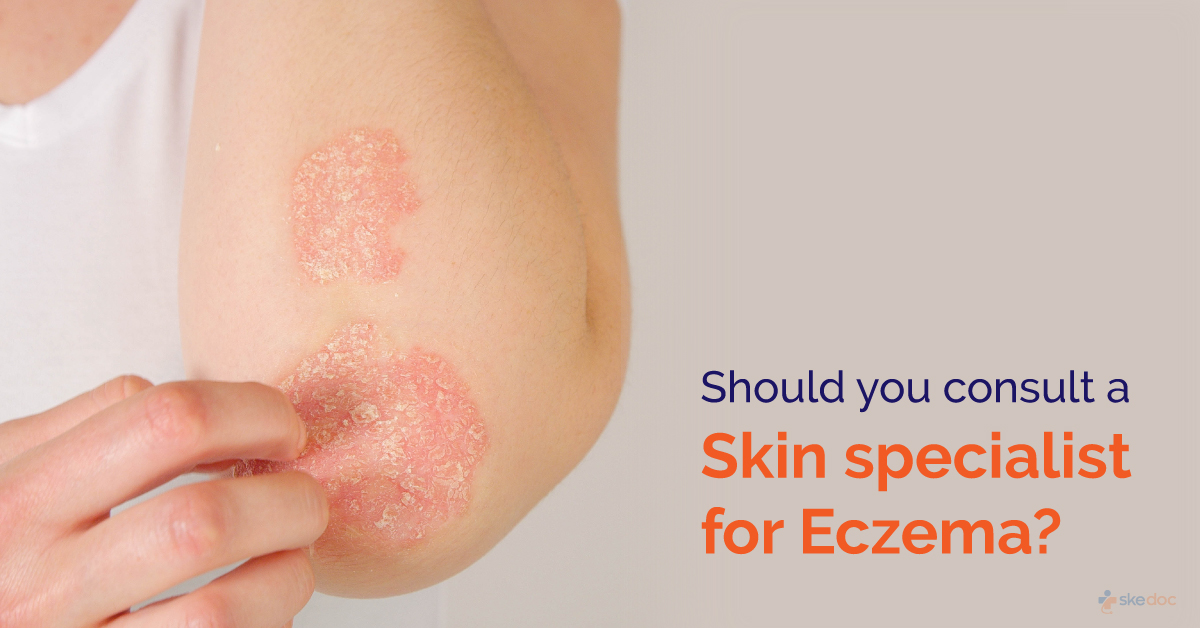Allergy
Blood Diseases
Bone & Joints
Brain
Cancer
Child Care
Cosmetic Surgery
Diabetes
Endocrinology
ENT
Eye
Gen Medicine
General Surgery
Heart
Kidney
Lifestyle
Liver & Digestive
Lung
Men’s Health
Mental health
Physiotherapy
Rheumatology
Skin and hair
Sleep Disorders
Spine
Transplant
Women Health
Thyroid
Vascular Surgery
Should You Consult a Dermatologist for Eczema

Eczema is an itchy condition accompanied by inflammation affecting the skin and it can be either a short-term or a long-term condition. Eczema can present with a skin rash, cracked skin oozing clear fluid, followed by thickening and hardening of the affected skin. According to online dermatologists for eczema treatment, the condition is non-contagious (does not spread by touch or contact) and is commonly seen on the back of the knees, feet, ankles, elbows, wrists, the upper part of the neck, face, and scalp. This condition can also be seen in infants and children and it can continue into adulthood.
Signs and Symptoms of Eczema:
According to the best dermatologists, eczema is a long-term condition in most people and it presents intermittently with phases of flare-ups and intermissions. One of the initial findings of eczema is the presence of extremely dry skin, thickening of the skin and increased skin markings and the presence of rash and inflammation with reddish to brownish grey patches. Along with this, there is a presence of extreme itching which is usually worse at night. The inflammation results in the oozing of clear fluid, which is followed by the thickening of the skin and an increase in skin markings. Constant scratching can result in painful and swollen skin.
Causes of Eczema:
Eczema can be caused by genetic changes and mutations, exposure to irritants and allergens, and consumption of certain food substances and medicines. Individuals who have a family history of eczema, have a history of allergies, history of asthma or hay fever, are constantly exposed to dust and dust mites, and those with high levels of stress and anxiety are more prone to developing eczema than others.
Triggers of Eczema:
According to skin specialists for eczema treatment, the condition can be triggered by warm water baths, foods containing nuts or dairy products, and extreme cold or hot temperatures. In some people, woolen or synthetic clothing can trigger the condition. In others, cosmetics, soaps, perfumes, detergents, or other industrial or household chemicals can trigger eczema development.
Diagnosis of Eczema:
There are no specific tests or investigations that are done to diagnose eczema. A clinical examination by an experienced skin specialist is sufficient to confirm a diagnosis. In some cases when there is a suspected trigger, a patch test may be advised, and some blood tests to measure IgE antibody levels may also be advised.
Complications of Eczema:
According to skin doctors for treatment of eczema, untreated or improperly treated eczema can lead to complications such as skin infections that can turn dangerous, sleep disturbances due to severe itching at night, and an increased risk of developing asthma or other allergic reactions.
It is therefore important when the signs and symptoms of eczema are noticed either in children or in adults, it is important to consult a dermatologist or at least get a consultation online with an eczema specialist to get the right and proper advice for its management and prevention of complications.
Should you consult a dermatologist for eczema and how do they treat the condition?
A dermatologist is a right specialist to consult for the management of eczema. If there are other factors such as allergies that are present, a consultation with an allergist & immunologist is also advisable.
According to dermatologists, there is no permanent cure for the condition, and the management includes medications and supportive care to manage symptoms and precautions and measures to avoid triggers and flare-ups. There is no cure for atopic dermatitis. Management of atopic dermatitis focuses on easing the symptoms and reducing the frequency of flare-ups. Medical Treatment of atopic dermatitis or eczema includes topical corticosteroid cream and ointments such as hydrocortisone and oral corticosteroids such as prednisone are administrated to control itching and repair the skin.
Systemic immunosuppressants including medications like ciclosporin, methotrexate, and azathioprin are also used in atopic dermatitis and eczema treatment. An intervention such as light therapy in which the affected area is exposed to sunlight helps to decrease the severity and frequency of the flare-ups. Wet dressing therapy where topical corticosteroids are applied to the affected area and wrapped with a wet dressing helps to promote healing.
Prevention of Eczema:
According to the best dermatologists for eczema treatment, lifestyle modifications and preventive measures for atopic eczema include moisturizing the skin at least twice a day, as this prevents dryness and scaling of the skin.
Avoiding irritants that trigger the condition such as sweat, soaps, detergents, dust, chemical solvents, etc. is also important to prevent the triggering of the condition and subsequent flare-ups. It is important to avoid hot water baths and instead bathe with lukewarm water. It is important to be aware of which cosmetics and beauty products act as triggers for the condition and avoid their use completely, and also use only mild soaps on the skin. Wearing clothing that is loose fitting and not too tight and avoiding synthetic materials and woolen clothes is also a measure that can be taken to prevent eczema from being trigged.
Even when the itching is very severe and intense, it is advisable to avoid scratching and instead apply an anti-itch cream or ointment or take anti-allergy medications that help to alleviate itching. If itching is too severe, covering the skin with bandages can prevent unwanted or repeated scratching. In children, it is important to identify and avoid irritants and allergens that cause skin irritation and avoid exposing them to extreme temperatures, both heat, and cold. Even in children, the use of moisturizers, bath oils, and creams to prevent dryness can help to reduce flare-ups.
Was this article helpful?
YesNo
Comments





